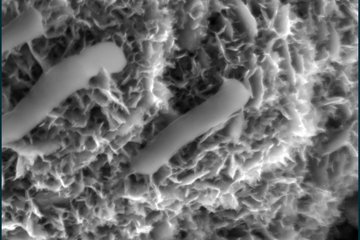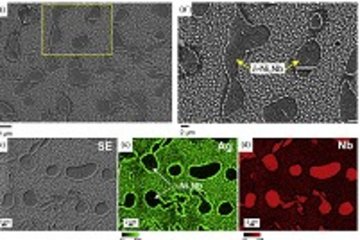All genres
1.
Journal Article
Cementite decomposition and coke gasification in He and H2–He gas mixtures. Corrosion Science 46 (3), pp. 667 - 679 (2004)
2.
Journal Article
Metal dusting of ferritic Fe–Al–M–C (M=Ti, V, Nb, Ta) alloys in CO–H2–H2O gas mixtures at 650 °C. Materials and Corrosion 54 (10), pp. 778 - 784 (2003)
3.
Journal Article
Effect of Gas Composition on Cementite Decomposition and Coke Formation of Iron. Corrosion Science 45 (2), pp. 281 - 299 (2003)
4.
Journal Article
Characterisation of the coke formed during metal dusting of iron CO-H2-H2O gas mixtures. Corrosion Science 45, pp. 1329 - 1341 (2003)
5.
Journal Article
Coke formation during metal dusting of iron in CO–H2–H2O gas with high CO content. Materials Science and Corrosion 54, pp. 770 - 777 (2003)
6.
Journal Article
α-Fe layer formation during metal dusting of iron in CO-H2-H2O gas mixtures. Materials and Corrosion 54, pp. 763 - 769 (2003)
7.
Journal Article
Inhibiting the reoxidation of directly reduced iron by vapour phase inhibitors. Steel Research 73, p. 421 - 421 (2002)
8.
Conference Paper
Metal dusting of binary Fe–Al alloys in CO–H2–H2O gas mixtures. The Conference on "Corrosion Science in the 21st Century", UMIST, University of Manchester Institute of Science and Technology, UK, 2003-07. Corrosion and Science Engineering 6 (87), pp. 1 - 20 (2004)
9.
Conference Paper
Metal dusting of iron in CO–H2–H2O gas mixtures at 600 °C. The Conference on "Corrosion Science in the 21st Century, UMIST, University of Manchester Institute of Science and Technology, UK, 2003-07. Corrosion and Science Engineering 6 (100), pp. 1 - 20 (2004)
10.
Conference Paper
Decomposition of cementite during gas carburization. In: EUROCORR 2001, 1. Proc. EUROCORR 2001, Riva del Garda, Italy, 2001. (2002)
11.
Talk
Thermodynamics and kinetics of phase transformations during metal dusting of iron and iron-based alloys. CALPHAD XXXIII, Krakow, Poland (2004)
12.
Talk
Carburisation of Fe3Al-based alloys in CO–H2–H2O mixtures. EFC-Workshop: Metal Dusting, Carburisation and Nitridation, Frankfurt, Germany (2003)
13.
Talk
Metal dusting of iron in CO–H2–H2O mixtures at 700 °C. EFC-Workshop: Metal Dusting, Carburisation and Nitridation, Frankfurt, Germany (2003)
14.
Poster
Metal Dusting of iron aluminium alloys. 3rd Discussion Meeting on the Development of Innovative Iron Aluminium Alloys, Mettmann, Germany (2006)
15.
Poster
Metal dusting of Fe3Al-based alloys. Annual Meeting 2003, Symposium: International Symposium on Intermetallics and Advanced Metallic Materials, San Diego, CA, USA (2003)











